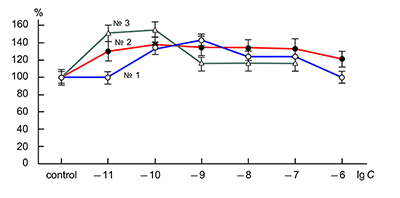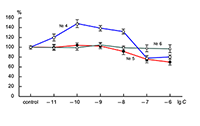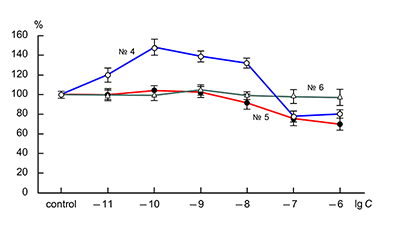The 40th Anniversary of the Institute of Physiologically Active Compounds of the Russian Academy of Sciences
The Effect of New Synthetic Analogs of Semax Peptide Preparation on AMPA-Receptors
in Purkinje Neurons of Cerebellar Rats
1Institute of Physiologically Active Compounds of the Russian Academy of Sciences, 1 Severny proezd, Moscow region, Chernogolovka, 142432 Russia;*e-mail: bovina_e@ipac.ac.ru
2Institute of Molecular Genetics of the Russian Academy of Sciences,
2, Academician I.G. Kurchatov’s square, Moscow, 123182 Russia
Key words: peptide analogues of Semax; AMPA receptors; Purkinje neurons
DOI: 10.18097/BMCRM00034
New peptides analogues of Semax can potentiate AMPA receptors induced currents at lower concentrations (10–11–10–8 M) than those of Semax. This ability suggests that they may have cognitive-stimulating properties.
ACKNOWLEDGEMENTS
The study was conducted in accordance to the Research Topic No. 48.8 «The search and determination of the mechanisms of neuroprotectors and stimulators of cognitive functions» in the framework of the State Task for the Institute of Physiologically Active Compounds of the Russian Academy of Sciences (Topic: No: 0090-2017-0019).
The equipment of the Centre of collective usage of IPAS RAS was used in the work (Agreement No. 14.621.21.0008, work identifier RFMEFI62114X0008).
REFERENCES
- Gold, P. E. Vanbuskirk, R. (1976). Enhancement and Impairment of Memory Processes with Post-Trial Injections of Adrenocorticotropic Hormone. Behavioral Biology, 16(4), p. 387-400. DOI
- Ashmarin, I. P., Nezavibatko, V. N., Myasoedov, N. F., Kamensky, A. A., Grivennikov, I. A., Ponomareva-Stepnaya, M. A., Andreeva, L. A., Kaplan, A. Y., Koshelev, V. B., Ryasina, T. V. (1997). Nootropic analogue of adrenocorticotropin 4-10-semax (the experience of design and investigation over 15 years). Zhurnal Vysshei Nervnoi Deyatelnosti Imeni I P Pavlova, 47(2), p. 420-430.
- Dolotov, O. V., Seredenina, T. S., Levitskaya, N. G., Kamensky, A. A., Andreeva, L. A., Alfeeva, L. Y., Nagaev, I. Y., Zolotarev, Y. A., A., G. I., Engele, Y., Myasoedov, N. F. (2003). The heptapeptide SEMAX stimulates BDNF expression in different areas of the rat brain in vivo. Doklady Biological Sciences, 391(1-6), p. 291-295. DOI
- Grigoriev, V. V., Andreeva, L. A., Zamoyski, V. L., Shevchenko, V. P., Bachurin, S. O., Myasoedov, N. F. (2015). The action of the peptide drug Semax on the currents of AMPA receptors of rat cerebellar Purkinje cells. Doklady Biochemistry and Biophysics, 460(1); p. 47-48. DOI
- Hamill, O. P., Marty, A., Neher, E., Sakmann, B., Sigworth, F. J. (1981). Improved patch-clamp techniques for high-resolution current recording from cells and cell-free membrane patches. Pflugers Archives, 391(2), p. 85-100. DOI
- Kaneda, M., Nakamura, H., Akaike, N. (1988). Mechanical and enzymatic isolation of mammalian CNS neurons. Neuroscience Research, 5(4), p. 299-315. DOI



